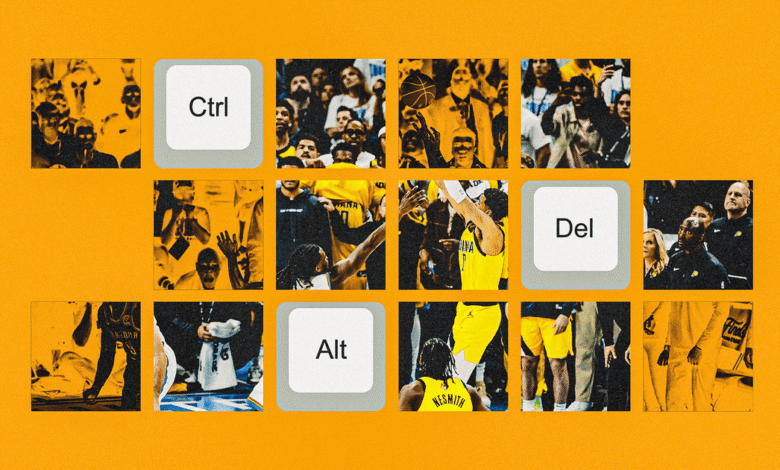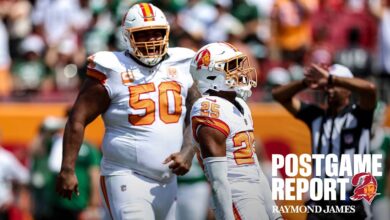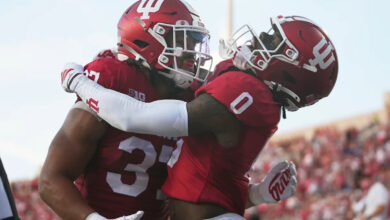When players like Tyrese Haliburton hit buzzer-beaters, it can be a sportswriter’s nightmare

As the Indiana Pacers trailed by 14 points with about three minutes to go in Game 1 of the Eastern Conference finals, I watched from my media seat on the Chase Bridge at Madison Square Garden and plotted out my instant-reaction plan.
“I’ll write about how Haliburton needs more help,” I wrote in our work Slack chat at 10:34 that evening, referencing the Pacers’ All-Star guard. “As long as this game doesn’t turn.”
The game seemed likely over, but Aaron Nesmith kept drilling 3s and the New York Knicks’ lead kept shrinking. My fellow media members who sat beside me were trickling downstairs to make it to the news conference room on time. My interest kept piquing. Maybe the game was over, but it could still have a fun ending.
I decided to stay in my seat.
When you cover a game in person, especially a playoff game, you don’t want to miss the big moments. That’s what you are there for. Sometimes that means sitting through a thrilling back-and-forth affair. Sometimes, it means waiting out win probability charts to make sure they don’t lose out to the unpredictability of real life.
You stick around for those 0.1 percent moments.
And this turned out to be one of those moments — the game turned as Tyrese Haliburton himself ended up hitting a hero shot for the win.
Some 10 minutes after sending my previous message, my tone swung in the other direction.
“DELETE DELETE DELETE,” I wrote.
I wasn’t the only one scrambling to adjust in real time to the moment. Other writers and editors on the series reacted as Haliburton’s jumper at the end of regulation was ruled a 2 and the game went into overtime.
“I might need to retweak my takeaway lol,” Knicks writer James L. Edwards III said.
“LMAOOOOO welcome to my playoffs experience, everyone,” said NBA writer Shakeia Taylor, who has been covering the Pacers through their amazing, drama-filled playoff run. “You cannot write before the game ends.”
It is no different for the folks who have to figure out what to write and put the stories out. Our Slack chats get pretty wild around this time. Story ideas a reporter pitched with three minutes to go can be scrapped a few 3s later. Editors and writers are reacting and rethinking in real time. Good ideas quickly become obsolete ones.
Things get really exciting in the Slack channel when the words “Several people are typing …” appear on-screen.
It was no different Thursday night, during Game 1 of the NBA Finals, when the league gave us all another absurdly entertaining ending, again courtesy of Haliburton’s heroics.
Once more, editors and writers had to change directions.
“RIP IT UP!” a coordinating editor wrote in our Pacers-Thunder Slack channel moments after another Haliburton Hail Mary.
These moments are chaotic, they’re riveting, and they’re pressure-packed. The reporters covering the big games are not writing a first draft of history — by now, that’s happening live on your TV or phone — but we are relied on to produce an even more detailed second version. We are your eyes and ears, your vibe check and your avatar sidling up to a superstar to get the full story of what everyone just saw. It is a great job, one we’re privileged to have and one we take seriously. That’s never more true than in moments like the ones the Pacers have produced over and over this spring.
But those kinds of instances take place all across sports, and The Athletic has a team of reporters in place to make sure we document the moments generations turn on. Here are some stories about their stories covering the biggest moments in sports.
Malcolm Butler changes the story and NFL history
My seat in the press box for Super Bowl XLIX was next to the Seattle Seahawks’ website staff.
As Seattle drove down the field, they were prepping to update the front page of their website with a back-to-back Super Bowl champs logo as soon as the game ended.
Then Russell Wilson threw the interception to Malcolm Butler, and in the aftermath, I remember seeing a team employee close out of whatever Adobe product they were using and that dialogue box popping up: Do you want to save your work?
They clicked no.
— Stephen Cohen, managing editor, enterprise
A beleaguered coach, a missed penalty and a … wayward vegetable?
Imagine your carefully crafted prose being ruined by a cabbage. Not only a cabbage, but mostly a cabbage.
A few years ago, while working for a freelance agency, I was sent to cover Aston Villa vs. Preston North End for three newspapers.
It was an evening game, so deadlines were tight. For one paper I had to file on 70 minutes (in the match), and for another, it was 75 minutes. In the event of late changes, I had to phone the sports desk and dictate copy to the sub-editor.
It all seemed straightforward at that stage: 10-man Villa improving their promotion chances and easing the pressure on their under-fire manager, Steve Bruce.
I’m not suggesting my copy was award-winning, but it did at least make sense and conveyed the story of the night. Over the next 15 minutes, Preston equalized, then went ahead, then conceded an equalizer in the final minute before conceding a stoppage-time penalty, which Villa duly missed.
So, the story became “Preston snatch late equalizer to pile pressure on Bruce,” then “Preston grab dramatic late winner to leave Bruce on the brink.” Then “Villa equalize in the 90th minute to possibly save Bruce’s job” to “Glenn Whelan misses a Villa penalty with literally the final kick of the game to leave Bruce looking broken.”
Just when we thought it was all over, we discovered via social media that a fan had thrown a cabbage at Bruce from the stands during the second half as a bizarre protest.
Six goals, a streaker, a controversial red card, 2 fightbacks, a penalty miss with the final kick, one angry manager, thousands of angry fans and a cabbage… My report for @TimesSport on the maddest game I’ve covered. #AVFC #PNE https://t.co/zLmxI2iPyK
— Steve Madeley (@SteveMadeley78) October 3, 2018
Cue another rewrite over the phone, including for the third paper, The Times, for which I’d filed my “final version” as the final whistle blew, just before we learned about the cabbage.
I think I made 11 phone calls to three papers in less than 20 minutes to help with God knows how many rewrites. I don’t think any more than 100 of my original words survived across all three publications.
The maddest night of my match-reporting career.
— Steve Madeley, Wolverhampton Wanderers writer
Read Steve’s story from that mad night: Cabbage hurled at Steve Bruce as Aston Villa fans vent their anger
Some Sun Devilish work in Southern California
On Oct. 4, 2014, I was in the press box of Los Angeles Memorial Coliseum for an Arizona State-USC night game. I covered Arizona State, which trailed 34-25 with three minutes left. Not only was the game over, but also I felt Arizona State’s season was over.
The previous season, Arizona State had advanced to the Pac-12 title game. Expectations were high entering 2014, but little had gone right. In Week 3, starting quarterback Taylor Kelly broke his foot in a win against Colorado. In Week 4, UCLA had blistered the Sun Devils 62-27 at home.
To stay alive in the Pac-12 South, Arizona State needed to beat No. 16 USC. And it wasn’t happening.
This is what I wrote as Arizona State took possession: Yes, there’s a lot of season left, but the Sun Devils are pretty much cooked. Then Arizona State backup Mike Bercovici hit Cameron Smith for a 73-yard touchdown. USC 34-32. OK, I’m still good. All USC has to do is run out the clock.
This was during my newspaper days, when editors needed the story as soon as the game went final. I had a decision to make. I added a sentence about Arizona State fighting to the end and stuck to the plan. USC punted. The Sun Devils took possession on the ASU 28 with 17 seconds left. I wrote a final paragraph and was ready to send.
Bercovici completed a 26-yard pass and spiked the ball to stop the clock. First down on USC’s 46. Seven seconds left. You see where this is going.
I followed Bercovici’s Hail Mary pass through the air. Not once did I think it had a chance. Too high, not far enough. And at the last second, an Arizona State receiver named Jaelen Strong swooped in and grabbed the football in a crowd of Trojans. Touchdown. Arizona State wins 38-34.
I looked around the press box. An Arizona State staffer said, “Holy s—.”
I sat down, deleted every word and started over. Arizona State won its next four.
— Doug Haller, senior writer, Arizona
Sports Illustrated isn’t the only place for jinxes
Back when I worked for newspapers and had to file pregame notes, I learned very quickly never to write about a bullpen/relief pitcher’s run of recent success.
It’s a guaranteed blown save, which means you have to rewrite your running game story and perform emergency surgery on the notebook. (Thank you, Troy Percival.)
I scoff at all jinxes, but this one is real.
— Andrew Baggerly, senior writer, San Francisco Giants
Give that receiver a hand (and get me a rewrite!)
In 2013, I covered UCF football on its run to the Fiesta Bowl. The Blake Bortles season.
Eight of its 13 games were decided by 7 points or fewer. Four were won by scores inside the final five minutes. UCF won a fifth on a last-second goal-line stand.
I remember during one of those games, I filed a story about UCF losing to Temple. I took an elevator down to the field at Lincoln Financial to try to get some scene of the dream season ending in Philadelphia.
From the far end zone, I saw Bortles escape a sack and throw a deep pass that looked just out of reach of receiver J.J. Worton. I looked up at the big screen. Worton went full extension and caught it with one hand. A security guard standing next to me in a yellow jacket went sprinting down the tunnel, screaming in disbelief at the catch. ESPN would do a “Sport Science” segment on how he was able to haul it in.
With 1:06 left on the clock, UCF was back in the game. I jumped into the stands to rewrite my story on my phone. UCF would get the ball back and hit a game-winning field goal. In the end, my story came from another scene in the tunnel, so at least the early press box exit was somewhat useful.
That Temple game was one of at least three stories I completely rewrote on deadline that season.
— Paul Tenorio, national soccer writer
Marie-Philip Poulin crushes dreams of opponents and writers alike
Canadian hockey icon Marie-Philip Poulin is an assassin with a hockey stick, a preternatural goal scorer who saves her best for when she faces the Americans.
She’s also a killer of game stories.
The dateline was Sochi, Russia. February 2014. The United States women’s hockey team was a minute away from a gold medal against rival Canada. Though I was pretty much done with a first write-through, Poulin was far from done.
The Canadian forward beat U.S. goaltender Jessie Vetter from the edge of the crease with 54.6 seconds left to tie the score at 2. Poulin, who beat the Americans in Vancouver four years earlier with two goals in the gold medal game, did it again in overtime. She scored a power-play goal 8:10 into the extra session for the winner. Golden goal, Canada.
My colleague Sarah Kwak and I were preparing celebratory stories for Sports Illustrated. The Canadians had not lost in Olympic women’s ice hockey since 1998, a streak of 20 consecutive games. Finally, the Americans had broken through. The dragon was slain. A new era in women’s hockey. That was what my SI.com column was about.
Instead, there were frantic emails (no Slack then) during overtime featuring multiple scenarios of what to do. We each had to write the shell of two distinctly different stories — the U.S. finally breaks through or Canada owns the U.S. again.
When it was over, I ultimately focused on how close the U.S. was to a gold medal, and a devastating postgame press scrum featuring tears.
Marie-Philip Poulin, a name I’ll remember forever.
— Richard Deitsch, senior writer, sports media
A Stanley Cup runneth over … with connection issues
The thing about hockey is, there’s no 3-pointer down two, no touchdown down four. Losses don’t become wins at the buzzer, they become ties. Then you have a precious 18-minute third intermission to prepare ledes for all eventual outcomes — team wins, team loses, game ends too late for this edition of the newspaper — and then they become wins. Sometimes many hours later.
Except for the one time a loss became a win. Or, more accurately, a loss became a Stanley Cup.
The lockout-shortened 2013 NHL season was my first year on the Blackhawks beat for the Chicago Sun-Times, and Game 6 in Boston was the biggest game I had ever covered to that point. Chicago was up 3-2 in the series but down 2-1 late in the third period.
I’m not a fan of prewriting, even for obvious moments like a championship, because I’m a stickler for authenticity — I want to feel the moment, not anticipate it — so I do much of my writing in the second intermission and third period. And with just a couple of minutes left, I had written a pretty darn good running gamer teeing up an incomprehensibly huge Game 7 at the United Center. I figured if the Hawks tied it with the goalie pulled in the final minute, I’d have the intermission to do the ol’ Command-A Delete and adjust accordingly. Happens all the time in hockey, right?
Then a loss became a win.
Bryan Bickell tied the score with 1:16 left in the third period. OK, no worries. But as most of us were still tweeting about the equalizer, Dave Bolland batted in a Johnny Oduya rebound off the post with 58.3 seconds to go.
In 17 seconds, the Blackhawks went from down 2-1 to up 3-2, less than a minute away from a championship. It was a 3-pointer down two, a touchdown down four. Most of the press room didn’t even see the Bolland goal; I happened to look up just before it. I involuntarily yelped out a curse, and dozens of wide-eyed faces popped up all around me.
Somehow, in 58.3 seconds, I threw together a coherent narrative that even had some color and some emotion behind it. It wasn’t the best thing I’ve ever written, but for a running insta-gamer of perhaps the wildest ending in NHL history, it lived up to the moment well enough.
The horn blew, the Blackhawks celebrated, I went to hit “send” on the file and … my Wi-Fi crapped out. Just mine. Everyone else was doing fine. Biggest moment of my career, biggest story of my life, and I couldn’t send it. Couldn’t post it. Couldn’t do anything with it.
I lost my mind and threw a tantrum that would make my 9-year-old blush, banging the table and throwing F-bombs all over the place in front of all my new colleagues. Made a total fool of myself in front of so many people I had read and respected and idolized as a kid and as a professional. People whose respect I desperately craved. Not my finest moment.
At that point, a prominent Canadian columnist whom I had never met came over and calmly offered me his iPhone hotspot password (this was still relatively new technology in 2013, and something I didn’t have) and saved my story, saved my job, saved my career, saved my life.
The next morning, all my editors back in Chicago told me I had done such a great job and handled myself so well under the toughest of circumstances.
If they had only known.
— Mark Lazerus, senior NHL writer
Wait … what happened to Florida State?
I was working for the Tampa Bay Times when Florida State beat Louisville to win the 2023 ACC championship.
The next morning, I had two stories ready to go: One saying the 13-0 Seminoles were in the College Football Playoff, and one saying they were left out. I put the “in” story in the system and was ready to hit publish when the four-team field was revealed.
The airport bar’s TV was ahead of my feed, apparently, because I heard Florida State fans gasp in disbelief before the bracket popped on my screen. The Seminoles were not in after all.
I deleted that story (it never went live) and swapped it for the “out” story. My reaction, after the immediate version was published: Now what?
Though I knew Florida State’s omission could happen, I didn’t think it would happen. The “in” version would have been easy to update with early thoughts on the semifinal matchup.
The shock and reaction to the “out” version required a lot more writing and reporting … while the team was back in Tallahassee and I was still in Charlotte. I found a relatively quiet spot on the ground near an airport shop so I could hop on a teleconference with CFP officials, then hoped a boarding announcement didn’t blare when it was my turn to ask a question.
I successfully stammered through something about the strength of schedule and common opponents. I wrote some more context and boarded my flight home.
Unfortunately, I knew when I touched down that the story was still far from over.
— Matt Baker, senior colleges reporter
Finally, great advice in four simple words
I know I was told this long ago, and I’m sure it wasn’t original at the time, and it’s certainly not my original. But when that happens, you can keep your lede.
Just make the next paragraph: “Or so it seemed.”
— C. Trent Rosecrans, senior writer, MLB and enterprise
(Illustration: Demetrius Robinson / The Athletic; photo: Alonzo Adams / Imagn Images)



